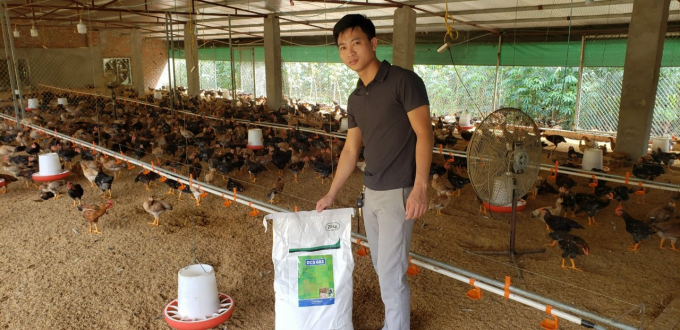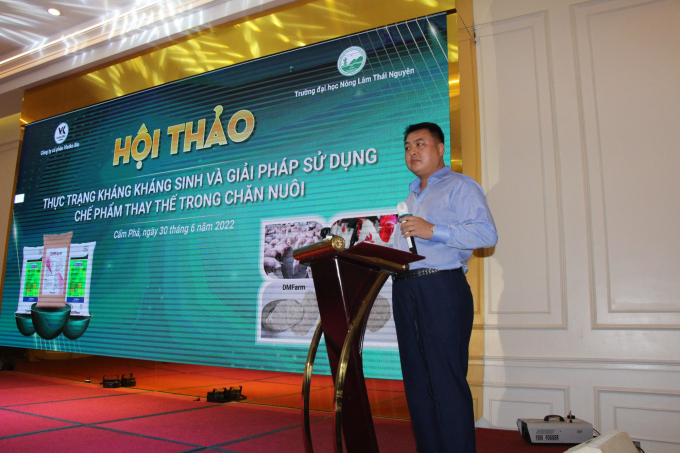June 20, 2025 | 15:48 GMT +7
June 20, 2025 | 15:48 GMT +7
Hotline: 0913.378.918
June 20, 2025 | 15:48 GMT +7
Hotline: 0913.378.918

An alternative to antibiotics, DCS 682 helps pets grow healthy. Photo: NT.
Antibiotic resistance is becoming a top concern of the World Health Organization (WHO). Vietnam is ranked as one of the countries with the highest antibiotic resistance rates in the world.
The seminar "The current situation of antibiotic resistance and solutions for using alternative preparations in livestock" was organized by Vietko Bio Joint Stock Company (Korea) in collaboration with Thai Nguyen University of Agriculture and Forestry in Cam Pha City, Quang Ninh province, according to statistics, up to 75% of antibiotics in livestock are imported from China. However, these drugs are not strictly controlled in consumption.
In Vietnam, the overdose or misuse of antibiotics in livestock and poultry farms is alarming due to the limited monitoring of drug use. Also, the daily demand for more is increasing.
A survey of the health sector on the sale of antibiotics in pharmacies in rural and urban areas in the Northern provinces showed that the awareness of antibiotic resistance among drug sellers and the people was still low. People buy antibiotics at drugstores as quickly as buying vegetables in the market.
Arbitrary use of antibiotics not following regulations or indications for livestock, causing drug residues in the animal's body, increasing the risk of drug resistance for humans when eating food derived from these animals.
According to Assoc. Dr. Nguyen Quang Tinh, senior lecturer at Thai Nguyen University of Agriculture and Forestry, in the face of an increasing trend of antibiotic resistance, the proactive use of preparations and additives in animal feeds derived from natural sources. However, it will help ensure the safety of animals and consumers.

Mr. Jo Wan Su, General Director of Vietko Bio Joint Stock Company, shared the potential advantages of antibiotic substitutes. Photo: Nguyen Thanh.
In 2021, Vietnam will import 700,000 tonnes of feed additives and supplements, equivalent to US$ 1 billion. Although it is an agricultural country, our country is not actively producing animal feed additives.
Currently, some foreign enterprises are also promoting research and investment cooperation to produce animal feed additives in our country to reduce dependence on imports gradually and lower product costs to help farmers save production costs.
According to the Faculty of Animal Husbandry and Veterinary Medicine, Thai Nguyen University of Agriculture and Forestry, it needs to use preparations to replace antibiotics in livestock to overcome the current antibiotic resistance.
This unit announced the experimental work to develop the process of using and recommending the use of DMFARM and DCS682 products of Vietko Bio Joint Stock Company, which helps animals increase antibodies, thereby reducing and gradually replacing antibiotics in livestock. This experiment was implemented on livestock of Thien Thuan Tuong Mining Joint Stock Company (Cam Pha City, Quang Ninh province).
Mr. Jo Wan Su, General Director of Vietko Bio Joint Stock Company, said that the company started the investment with the desire to bring the best feed additives produced by advanced technology from Korea to Vietnam. The company will conduct technology transfer to manufacture products in Vietnam directly in the coming time.
Assoc. Dr. Nguyen Quang Tinh, Thai Nguyen University of Agriculture and Forestry, said that in the coming time, feed additives would gradually replace antibiotics, helping livestock to grow healthy, reducing antibiotic residues, improving product quality, and ensuring safety for consumers.
Vietko Bio will transfer the production process of animal feed additives to Vietnam
Vietko Bio Joint Stock Company in Bac Ninh City, Bac Ninh province is one of the pioneers in importing animal feed additives to Vietnam.
This is a Korean-invested company, combined with leading partners in producing livestock products in Korea to apply technology and science technology to bring quality products. The most effective, safest, and most effective for Vietnamese farmers.
Currently, two products are being distributed by the company in Vietnam, namely DMFarm and DCS 682. These products are 100% made in Korea.
The product DCS 682, when tested on chickens, increases the expression of genes that protect the nervous system, promotes cell proliferation and differentiation, accelerates the reproduction of new cells, helps increase growth fast, and improves feed efficiency.
Mr. Jo Wan Su, General Director of VietKio Bio Joint Stock Company, expressed his desire to become a supplier of high-quality biosafety products, applying leading science and technology to the livestock industry in Vietnam.
Translated by Ha Phuc
![Turning wind and rain into action: [9] Digitizing hydrometeorological data in response to climate change](https://t.ex-cdn.com/nongnghiepmoitruong.vn/608w/files/news/2025/06/17/z6704423696987_15fd32ffc26d590d204d520c9dac6786-nongnghiep-165943.jpg)
(VAN) Farmers have begun accessing hydrometeorological applications to adjust their cropping schedules, aiming to ensure productivity and adapt to climate change.
![Turning wind and rain into action: [8] Real-time salinity detection and early warning technology](https://t.ex-cdn.com/nongnghiepmoitruong.vn/608w/files/news/2025/06/17/z6704423696987_15fd32ffc26d590d204d520c9dac6786-nongnghiep-151127.jpg)
(VAN) Thanks to the integration of modern hydrological-hydraulic models, remote sensing technologies, and artificial intelligence, the accuracy of hydrological forecasting has significantly improved.
![Turning wind and rain into action: [7] Early disaster warnings help marine farmers minimize losses](https://t.ex-cdn.com/nongnghiepmoitruong.vn/608w/files/news/2025/06/17/z6704423696987_15fd32ffc26d590d204d520c9dac6786-nongnghiep-142942.jpg)
(VAN) In recent years, thanks to early disaster warnings and forecasting, marine farmers in Khanh Hoa province have been able to reduce risks and losses, thereby improving production efficiency.
![Turning wind and rain into action: [6] ‘Four on-the-spot’ disaster management software](https://t.ex-cdn.com/nongnghiepmoitruong.vn/608w/files/news/2025/06/17/e5a48259d6a262fc3bb3-nongnghiep-183800.jpg)
(VAN) By simply activating the scenario on the disaster management software, the relevant authorities immediately know how many households need to be evacuated, where to evacuate them to, and by what means of transportation…
![Turning wind and rain into action: [5] Hue applies modern technology in disaster forecasting](https://t.ex-cdn.com/nongnghiepmoitruong.vn/608w/files/news/2025/06/17/z6704423696987_15fd32ffc26d590d204d520c9dac6786-nongnghiep-093938.jpg)
(VAN) In Hue city, modern technology has recently been applied in meteorological and hydrological forecasting and warning, helping to reduce the damage caused by natural disasters.

(VAN) A cutting-edge farming technique being implemented on an experimental ranch in Arizona's Sonoran Desert has already saved a billion gallons of water over five years, according to Civil Eats.

(VAN) Poultry and pig production and the environment can be boosted through enhanced water technology, according to new research.